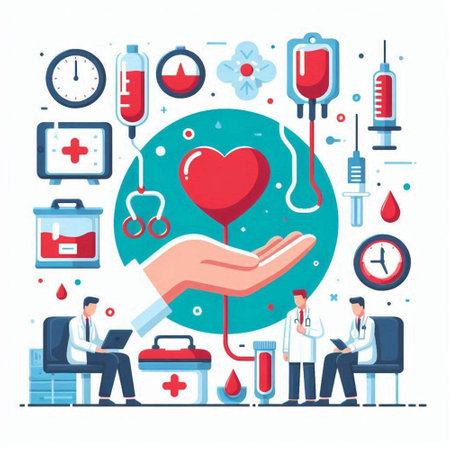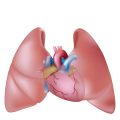1. Overview of COPD and Its Impact on Daily Life
Chronic Obstructive Pulmonary Disease (COPD) is a long-term lung condition that makes it hard to breathe. In the United States, millions of people live with COPD, which often includes chronic bronchitis and emphysema. This disease mainly affects older adults, especially those with a history of smoking or exposure to air pollutants.
COPD can impact nearly every part of daily life. Simple activities like walking, climbing stairs, or even getting dressed can become exhausting. Patients may feel short of breath, cough often, and get tired easily. Because breathing is more difficult, many people with COPD also experience anxiety and depression.
Here is a quick look at how COPD can affect everyday living for patients in the US:
| Area of Life | Common Challenges |
|---|---|
| Physical Activity | Shortness of breath, fatigue, trouble exercising |
| Social Life | Avoiding gatherings due to breathing problems or embarrassment from coughing |
| Mental Health | Feelings of anxiety, depression, or isolation |
| Daily Tasks | Difficulty with chores, shopping, or personal care |
| Work & Finances | Trouble keeping a job or managing medical costs |
For many Americans living with COPD, these challenges highlight the need for strong community resources and support networks. Access to help and understanding from others can make a real difference in how well someone manages their condition each day.
2. Local Community Health Programs and Support Groups
Finding COPD Support Groups in the US
COPD (Chronic Obstructive Pulmonary Disease) patients in the US can benefit from a variety of local resources and support networks. One of the best ways to get help is by joining support groups, which are available both in-person and online. These groups offer emotional support, practical advice, and a sense of community for people living with COPD.
Where to Look for Support Groups
| Resource | Description | How to Access |
|---|---|---|
| Local Hospitals | Many hospitals offer COPD-specific classes, workshops, and support groups led by healthcare professionals. | Check hospital websites or call their patient services department. |
| American Lung Association | This national organization offers the “Better Breathers Clubs” in many communities across the US. | Visit lung.org to find a club near you. |
| Community Health Centers | These centers may provide group education sessions or connect you with other local programs. | Search for local health centers at HRSA Find a Health Center. |
| Online Forums & Virtual Groups | Online support groups offer connection from home, including Facebook groups and forums like COPD Foundation’s COPD360social. | Search “COPD support group” on Facebook or visit copdfoundation.org. |
Engaging with Local Health Department Programs
Your city or county health department often runs programs aimed at chronic disease management. These may include:
- Pulmonary rehabilitation classes led by respiratory therapists
- Smoking cessation workshops and counseling services
- Bilingual programs for non-English speakers in some regions
- Public health fairs offering free screenings and educational materials about lung health
How to Get Involved:
- Visit your local health department’s website for program listings or call their information line.
- Ask your primary care doctor or pulmonologist for recommendations—they often know about community resources.
- If you have Medicare or Medicaid, ask about covered community-based wellness programs nearby.
The key is to reach out—most programs welcome new members and are designed to make living with COPD easier through shared experiences and access to expert advice.

3. National Organizations and Helplines
For people living with COPD in the United States, there are several national organizations and helplines that offer support, information, and resources. These organizations help patients and their families better understand COPD, manage their health, and connect with others facing similar challenges. Below is an overview of some of the most important groups you should know about.
American Lung Association (ALA)
The American Lung Association is one of the oldest and most trusted organizations dedicated to lung health. They provide a wide range of services for COPD patients including:
- Lung HelpLine: A free service where patients can talk to registered nurses, respiratory therapists, and counselors about their symptoms or concerns by calling 1-800-LUNGUSA (1-800-586-4872).
- Support Groups: In-person and virtual Better Breathers Clubs across the US for peer support.
- Education: Easy-to-read guides, videos, and online tools to help manage COPD day-to-day.
COPD Foundation
The COPD Foundation focuses specifically on improving the lives of those affected by COPD. Their resources include:
- COPD360social: An online community where patients, caregivers, and healthcare professionals can connect and share experiences.
- COPD Information Line: Reach trained InfoLine Associates at 1-866-316-COPD (2673) for personalized answers about COPD.
- Educational Resources: Free webinars, printed materials, and research updates.
Breathe Better Network
This is a network led by the National Heart, Lung, and Blood Institute (NHLBI), offering easy-to-understand resources about COPD prevention and management. Their materials are available in both English and Spanish.
Quick Reference Table: Major US COPD Support Resources
| Organization | Main Services | Contact/Helpline | Website |
|---|---|---|---|
| American Lung Association | Lung HelpLine, support groups, education | 1-800-LUNGUSA (1-800-586-4872) |
lung.org |
| COPD Foundation | COPD360social, InfoLine, education | 1-866-316-COPD (1-866-316-2673) |
copdfoundation.org |
| Breathe Better Network (NHLBI) | Educational materials (English/Spanish) | N/A (Online resource) | nhlbi.nih.gov/BreatheBetter |
Why Use These Resources?
Connecting with these national organizations can make a big difference in daily life for people with COPD. Whether you need advice from a healthcare professional, want to join a community of peers, or just need trustworthy information about your condition, these groups are here to help. They can also guide you to local resources like pulmonary rehab programs or financial assistance options if needed.
4. Accessing Home Care and Rehabilitation Services
Finding the Right Support for COPD at Home
For people living with COPD in the United States, having access to home care and rehabilitation services can make daily life safer and more comfortable. Many communities offer a variety of resources to help patients manage their condition at home. Here’s how you can locate the right services:
Types of Services Available
| Service Type | Description | How to Find |
|---|---|---|
| Home Health Care | Nurses or aides visit your home to help with medication, wound care, and daily tasks. | Ask your doctor for referrals or check with your health insurance provider. |
| Pulmonary Rehabilitation | Programs that teach breathing techniques, exercise, and education about COPD management. | Most local hospitals, clinics, or respiratory therapists offer these programs. Search “pulmonary rehab near me” online or call your local hospital. |
| Respiratory Therapy | Specialists provide breathing treatments, teach inhaler use, and monitor oxygen levels. | Your doctor can refer you, or you can find licensed therapists through organizations like the American Association for Respiratory Care (AARC). |
Steps to Access These Services
- Talk to Your Doctor: Your healthcare provider is your first stop for information. They can recommend which services are best for your needs and provide referrals.
- Check with Your Insurance: Many services are covered by Medicare, Medicaid, or private insurance plans. Call your insurance company to ask what’s included in your plan.
- Contact Local Agencies: Organizations such as the American Lung Association and local Area Agencies on Aging often have lists of community resources available for COPD patients.
- Use Online Directories: Websites like Medicare.gov’s Home Health Compare tool let you search for approved home health agencies in your area.
Pulmonary Rehabilitation: What to Expect
Pulmonary rehab programs usually include group classes where you’ll learn exercises tailored to your abilities, nutrition tips, and how to use medications correctly. These programs aim to improve your quality of life and reduce hospital visits.
Sample Weekly Pulmonary Rehab Schedule
| Day | Activity Example |
|---|---|
| Monday | Breathing exercises & light stretching |
| Wednesday | Treadmill walking & medication review |
| Friday | Nutritional counseling & support group discussion |
Tips for Making the Most of Home Care Services
- Create a list of questions before each visit from a nurse or therapist.
- Keep a daily symptom diary to share with your care team.
- If you live alone, consider asking about emergency alert systems or community volunteer programs that can check in on you regularly.
If you’re unsure where to start, don’t hesitate to reach out to local hospitals or non-profit organizations focused on lung health—they’re ready to help guide you through the process of finding the right home care and rehabilitation options for living well with COPD.
5. Financial and Transportation Assistance
Living with COPD can be challenging, especially when it comes to paying for treatments and getting to medical appointments. Fortunately, there are several financial aid programs and transportation options available in the US to help COPD patients manage these needs.
Financial Aid Programs
There are many resources that can help cover the costs of medication, doctor visits, and other necessary care. Here’s a quick overview:
| Program Name | What It Covers | Who Can Apply |
|---|---|---|
| Medicare | Hospital stays, doctor visits, prescription drugs (Part D) | People 65+, or with certain disabilities |
| Medicaid | Low-cost or free health coverage | Low-income individuals and families |
| Patient Assistance Programs (PAPs) | Free or discounted medications | Uninsured or underinsured patients (varies by program) |
| The HealthWell Foundation | Helps pay for insurance premiums, copays, deductibles, and out-of-pocket costs for specific diseases including COPD | Patients with demonstrated financial need |
| The American Lung Association Lung HelpLine | Guidance on finding financial assistance and navigating insurance paperwork | Anyone living with lung disease or their caregivers |
Insurance Navigation Help
If you find health insurance paperwork confusing, you’re not alone! Many organizations offer free support to help COPD patients understand their coverage options:
- State Health Insurance Assistance Program (SHIP): This program provides one-on-one counseling about Medicare benefits in every state.
- Lung Association Navigators: The American Lung Association has trained staff who can answer questions about insurance and connect you with local resources.
- Hospital Social Workers: Your hospital’s social worker can often guide you through applications for Medicaid, disability benefits, and financial aid.
Transportation Options for COPD Patients
Makes getting to your doctor’s office easier! Here are some common transportation services used by COPD patients in the US:
| Service Type | Description/Examples | How to Access |
|---|---|---|
| Local Transit Services (Paratransit) | Buses or vans equipped for people with disabilities; door-to-door service in most cities. | Contact your local transit authority for eligibility and scheduling info. |
| Non-Emergency Medical Transportation (NEMT) via Medicaid | Covers rides to medical appointments for Medicaid recipients. | Ask your Medicaid caseworker or call the number on your Medicaid card. |
| Seniors’ Rideshare Programs & Volunteer Driver Programs | Community volunteers drive seniors or those with disabilities to appointments; sometimes free or low-cost. | Check with your Area Agency on Aging or local senior center. |
| Taxis & Ride-Share Services (Uber Health, Lyft Concierge) | Pays for rides if approved by your healthcare provider or insurer; some hospitals partner with these services. | Ask your clinic social worker or nurse navigator for details. |
Helpful Tips for Getting Support
- If you’re unsure where to start, call the American Lung Association Lung HelpLine at 1-800-LUNGUSA.
- Your healthcare team can point you toward programs that fit your specific needs.
- If you have trouble affording treatment, speak up—there may be local grants, discounts, or assistance available!
You Are Not Alone!
No matter where you live in the US, support is available to help you manage costs and transportation as a COPD patient. Reach out to these resources—they’re here to help make life a little bit easier.


